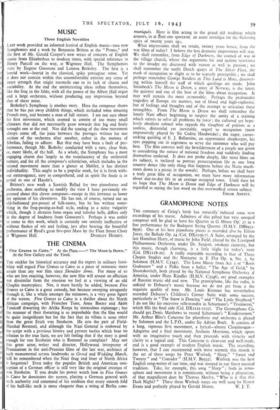THE CINEMA
" Five Graves to Cairo." At the Plaza.---4, The. Moon is Down." At the New Gallery and the Tivoli.
THE stickler for historical accuracy and the expert in military feasi- bility will regard Five Graves to Cairo as a piece of nonsense more arrant than any war film since Shoulder Arms. For many of us who are less exacting, however, the new film will arouse an affection not dissimilar from the emotion we feel at a viewing of an old Chaplin masterpiece. Not, it must hastily be added, because Five Graves to Cairo is a great comedy, but because sweeping arrogantly through it, like a whale amongst the minnows, is a very great figure of the screen. Five Graves to Cairo is a thriller about the North African campaign, with Franchot Tone, Anne Baxter and Akim Tamiroff thwarting the Afrika Korps by miraculous espionage ; but the manner of their thwarting is so improbable that the film would be quite insignificant but for the fact that its villain is none other than the great Erich von Stroheim. He acts the part of Field- Marshal Rommel, and although the Nazi General is endowed by the script with a previous history and present tactics which bear no relation to the true facts, we are left feeling that if the story is good enough for von Stroheim who is Rommel to complain? May not this great actor, writer and director, Hollywood interpreter of Prussianism in the anti-Prussian films of the last war, architect of such monumental screen landmarks as Greed and Wedding March, still be remembered when the Nazi thug and loser of North Africa is forgotten? Even today the popular British and American con- ception of a German officer is still very like the original creation of von Stroheim. If you doubt his power watch how in Five Graves to Cairo he dominates the screen, playing a German general with such authority and command of his medium that every smooth fold of his bull-like neck is more eloquent than a string of Berlin corn- muniques. Here is film acting in the grand old tradition which arouses, in at !East one spectator, an acute nostalgia for the flickering epics of twenty years ago.
What impressions shall we retain, twenty years hence, from the war films of today? I believe the less dramatic impressions will stay. We shall remember, from Edge of Darkness, the council of war in the village chinch, where the arguments for and against resistance to the invader are discussed with reason as well as passion ; we shall remember the sunlit Dutch quays of The Silver Fleet, the mark of occupation so slight as to be scarcely perceptible ; we shall perhaps remember George Sanders in This Land is Mine, discover- ing within himself the stuff of which quislings are made. John Steinbeck's The Moon is Down, a story of Norway, is the latest, the quietest and one of the best of the films about occupation. It may well remain the most memorable. Perhaps the profoundet tragedies of Europe are matters, not of blood and high-explosive; but of feelings and thoughts and of the attempt to articulate these intangibles. From The Moon is Down we shall remember the lonely Nazi officer beginning to suspect the sanity of a training which strives to solve all problems by force ; the cultured yet hope- lessly obedient colonel who regards the slaughter of patriots as a useless, distasteful yet inevitable, sequel to occupation (most impressively played by Sir Cedric Hardwicke) ; the eager, career- seeking quisling of E. J. Ballantine, an opportunist shopkeeper, his eyes popping out in eagerness to serve the customer who will pay best. The film conveys well the bewilderment of a people not given to considering the nature of national freedom and suddenly finding themselves enslaved. It does not probe deeply, like most films on its subject, is inclined to portray preoccupation life as one long country dance (the only thing that happens before the Nazis mush- room down is a picnic in the woods). Perhaps, before we shall have a truly great film of occupation, we must have more information about day-to-day life in an average occupied town. Until then let us hope that The Moon is Down and Edge of Darkness will be regarded as saying the last word on this overworked screen subject.
EDGAR ANSTEY.


























 Previous page
Previous page